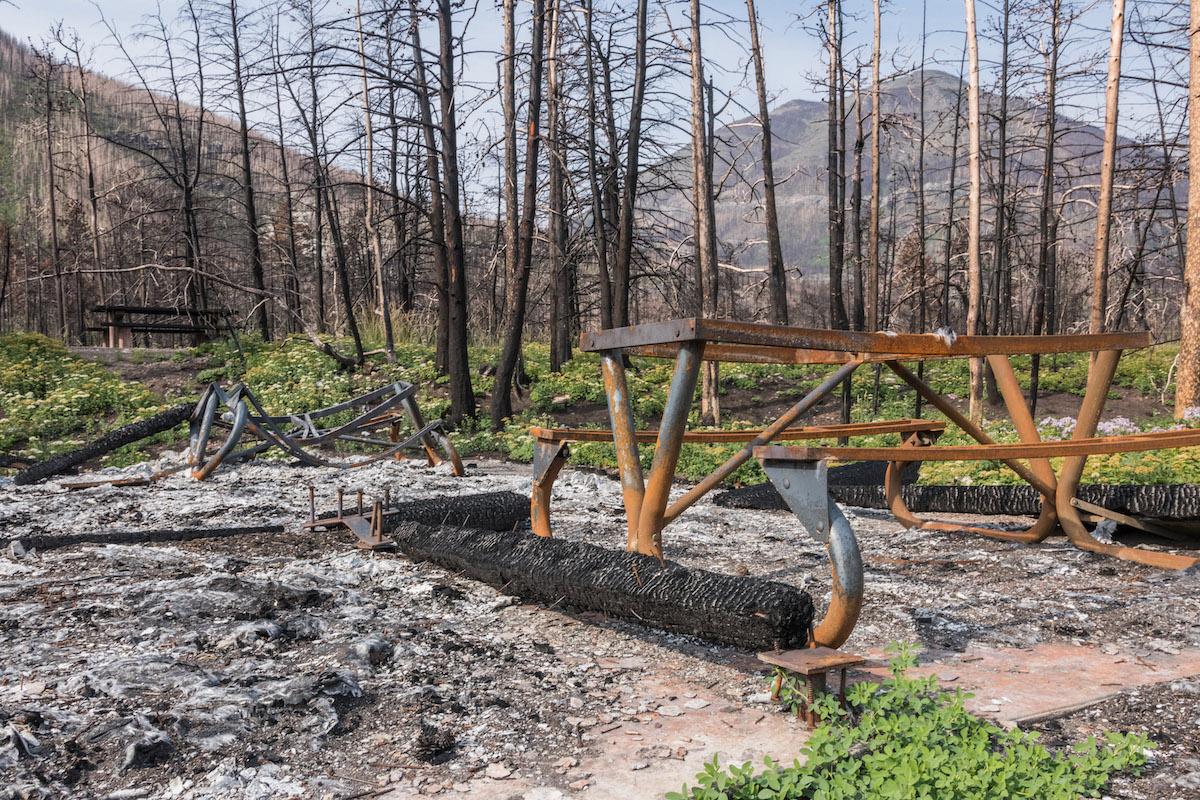
A 2018 shot of burnt infrastructure in Crandell Mountain Campground/Parks Canada
Waterton Lakes National Park is getting $8.7 million ($7.1 million USD) towards the design work and first phase of reconstruction for its Crandell Mountain Campground.
The Alberta campground was destroyed in the 2017 Kenow Wildfire and is being rebuilt, along with over 30 other assets, as part of the Road to Recovery program. Funding includes the design work for phase one and two of the campground, rare plant salvage and hazard tree removal, as well as phase one of reconstruction which includes completing underground utilities and infrastructure, the water tank and water treatment building, wildlife corridor reclamation and rough grading the Crandell Lake Trail parking lot and trailhead.
Construction should begin this spring, with green infrastructure at the forefront.
As well, the Townsite Campground reopened in time for the 2021 season on May 7. Ottawa has invested more than $10 million ($8.2 million USD) in it as part of the Federal Infrastructure Investment program. Improvements include redeveloped campsites with new trees, landscaping and utility infrastructure, resurfaced roads and new washrooms. Work continues on its maintenance facilities.
“The COVID-19 pandemic has highlighted the importance and health benefits of spending time outdoors,” Jonathan Wilkinson, Minister of Environment and Climate Change and Minister responsible for Parks Canada, said in a news release. With the Townsite Campground now fully open, Wilkinson said there are now more opportunities for Canadians to do so safely in Waterton. Rebuilding campgrounds with green, accessible infrastructure means an investment in both the park's visitor services and in protecting its ecological integrity.
“When we are on the other side of this pandemic, we look forward to welcoming back visitors from all over the world to experience the beauty of Waterton Lakes National Park,” said Wilkinson.

A 2016 photo of the Crandell Mountain Campground before the 2017 Kenow Wildfire/Parks Canada
Waterton is part of a UNESCO World Heritage Site. Together with America's Glacier National Park, it forms the world's first International Peace Park and International Dark Sky Park.
Since 2014, Ottawa has invested approximately $103 million (about $85 million USD) in Waterton Lakes in federal infrastructure funding.
In September 2017, the Kenow Wildfire burned roughly 20,000 hectares in the park. The wildfire impacted approximately 38 per cent of the park, resulting in loss or significant damage to visitor experience and operational assets. Most rebuilding has been completed as part of the Road to Recovery program, and Waterton is open.
The park is in Treaty 7 territory and has long been a place of significance for the region's Indigenous peoples.

The revitalized Townsite Campground/Parks Canada
Crandell Mountain Campground's tender package for phase one included an Indigenous Benefits Plan (IBP) in its evaluation criteria, to provide socioeconomic benefits to Indigenous communities and contractors within the region. Bidders were asked to provide specifics on inclusion of Indigenous labour, Indigenous training and the sub-contracting of Indigenous Businesses in their bid.
Sustainability and inclusivity are built into the campground design and Parks Canada is pursuing an Envision Gold award level for this project. Envision certification, administered by the Institute for Sustainable Infrastructure, is based on 64 sustainability and resilience indicators in five categories — quality of life, leadership, resource allocation, natural world, and climate and resilience.
The campground will feature an off-grid solar system providing most power, inclusive washroom buildings and accessible kitchen shelters and facilities. The design also features an improved wildlife corridor by reclaiming part of the existing campground.

 Support Essential Coverage of Essential Places
Support Essential Coverage of Essential Places



